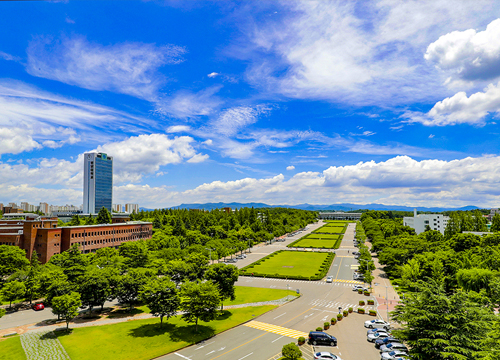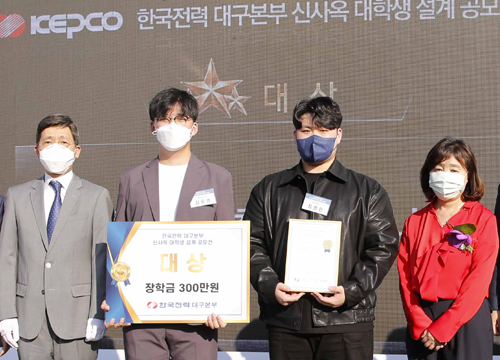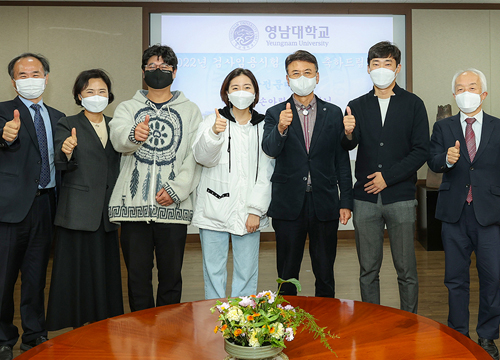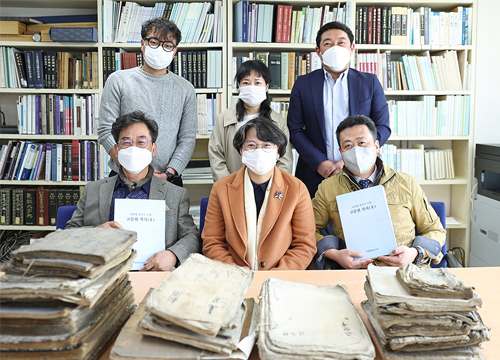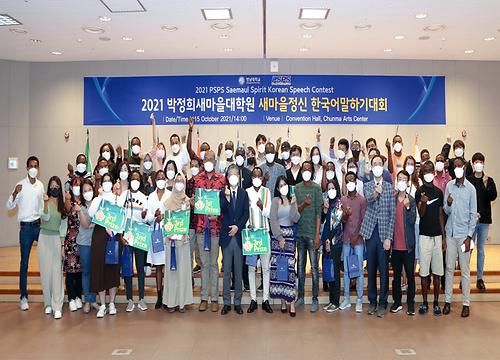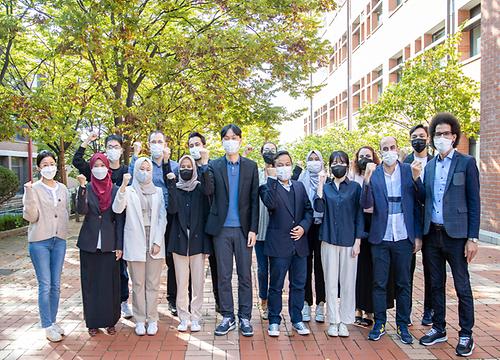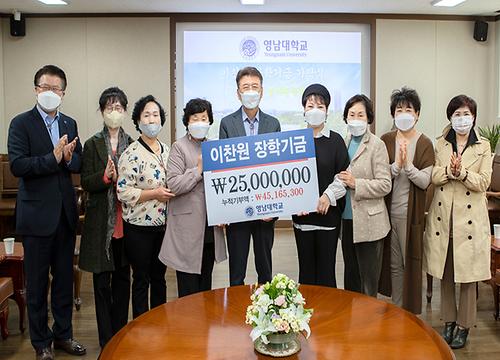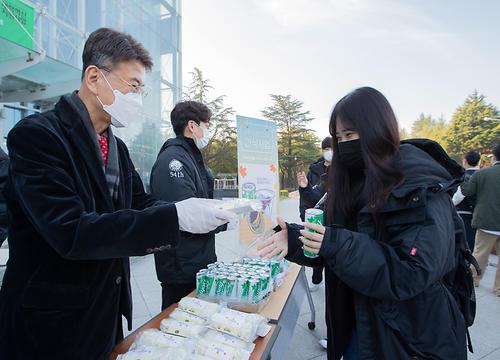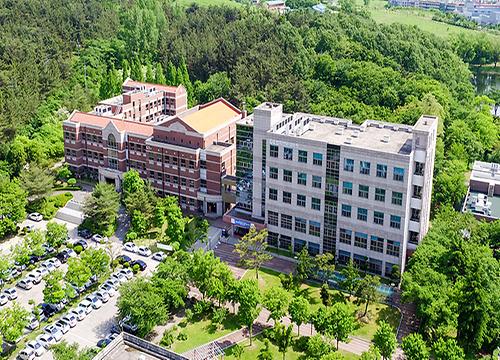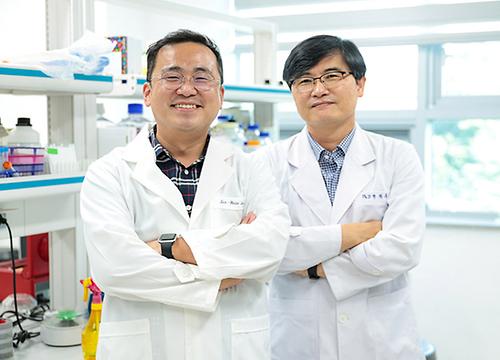-
Part of the Korea Forest Service’s ‘2022 Neighborhood Forest Project (Outdoor Neighborhood Gardens)’ 500 million KRW funding to build a 3,100㎡ garden in the center of the campus... Offering eco-friendly living space Supervised by Dep. of Landscape Architecture and to be used as practical training center for the department from the garden building stage [November 4, 2021] YU (President CHOI Oe-chool) will build a large garden at its campus. This project is part of the ‘2022 Neighborhood Forest Project (Outdoor Neighborhood Gardens)’ sponsored by the Korea Forest Service. This project aims at establishing gardens around neighborhoods and public facilities to expand green areas in everyday life to improve the quality of life for citizens, and it includes outdoor gardens, rooftop and indoor gardens, and vertical gardens. The YU Dep. of Landscape Architecture that was selected for this project will receive a total of 500 million KRW for the project, and plans to build a 3,100㎡ garden in the grass area between the YU Chunma Art Center and College of Business & Economics Building by the end of 2022. With this new garden at the YU campus, students will not only be able to enjoy a more pleasant campus, but also allow local residents to take advantage of eco-friendly life in the urban center. The YU Dep. of Landscape Architecture also plans to use it as a practical training area for the department starting from the campus garden building stage. Students majoring in this field will participate directly in the project and will be able to receive comprehensive education for building gardens through research, education, maintenance, and monitoring. Department of Landscape Architecture Dean Kwon Jin-wook who is overseeing this project said, “The garden in the YU campus is a new ‘campus community’ model using neighborhood forests. In particular, as there is a densely populated residential area around the university, it is a place with great potential for expansion that students and the community will make together.” He added, “I hope that in addition to members of the university, citizens of all ages, genders and social classes will be able to enjoy the new garden culture.”
-
Choi Young-hyun and Kim Dong-young team’s 'Open Frame Office’ creates ‘public value’ throughout the space Total of 103 people in 59 teams competed, and took first place after the first and second reviews [October 25, 2021] <Students of the School of Architecture who won the ‘grand prize’ at the KEPCO Daegu HQ New Building Design Contest> Students of the YU School of Architecture took the grand prize at the KEPCO Daegu HQ New Building Design Contest. The honors went to Choi Young-hyun (senior) and Kim Dong-young (junior) of the School of Architecture. At this contest held from June to August by the KEPCO Daegu HQ, they were judged first for their design and explanations, and then a second time with a video explanation of their work, and was finally chosen as first place, winning a cash prize of 3 million KRW. This contest was held for students enrolled at universities in Daegu and Gyeongbuk to offer the opportunity for empowering local college students under the theme of ‘Office building where the MZ Generation works.’ A total of 103 people in 59 teams participated, and 21 people in 12 teams were awarded. Their winning work was ‘Open Frame Office.’ Choi Young-hyun explained, “We paid attention to the spatial features of the KEPCO Daegu HQ where there are many public agencies. Rather than focusing on the individual functions of these public institutes, we believed that the entire block comprising the public institutes should be filled with public value,” while adding, “We did not make physical barriers like fences, resolved the issues of being inward for public institutes and facilities, and established an office space open to the city to create public locational value. Many existing office buildings concentrated only on functionality, and were situated like islands in the city. But we thought that for offices in the future, it would be important to form relationships with the city by including both functional aspects and public spaces.” The KEPCO Daegu headquarter building was constructed in 1986 and is currently planning for new construction to create the outdated building in Chimsan-dong into a local landmark. This contest was organized to share the vision for building the office building and to realize coexistence with the local community.
-
‘Park Byung-hoon, Sohn A-ryeong, Lee Seon-yeop’ scheduled to be appointed as prosecutors after graduation in February of next year Continuously graduating prosecutors from the first batch of Law School Students... 13 prosecutors thus far Taking first and second place for the past 3 years solidifying its status as a prestigious law school [November 3, 2021] <YU Law School students who passed the 2022 new prosecutors exam> (From third on left, Park Byung-hoon, Sohn A-ryeong, President CHOI Oe-chool, and Lee Seon-yeop of the YU Law School) YU Law School recently graduated three people passing the 2022 new prosecutors exam that the Ministry of Justice recently announced. Since its founding, YU Law School has continuously graduated prosecutors since its first batch of students, and now has a total of 13 graduates who have become prosecutors. In this new prosecutors exam, Park Byung-hoon (35), Lee Seon-yeop (33), and Sohn A-ryeong (26) who will be graduating in February of next year placed their names on the list. These students who will be appointed as new prosecutors in 2022 said, “Trusting and following the professors according to the systematic education program of the YU Law School has led to such good results. In addition to studies, YU also provided special care in many areas such as life on campus and psychological counseling, thus making it possible to concentrate on studies during our three-year program. The knowledge and experience gained at the YU Law School will be a great platform for our lives as legal professionals.” YU has been continuously recording outstanding achievements in the bar exam passing rate since its founding. It took second place in the 10th bar examinations in terms of national passing rates (for 10th Law School class). It has been ranking first and second place in the national bar exam passing rate over the past three years, ranking first for the 9th bar exam and second in the 8th bar exam, solidifying its status as a prestigious law school of Korea. Such achievements have led to higher competition rates for admissions into the Law School. The admissions competition to the Law School for 2022 that was closed in early October was 10.5 to 1, which was the second highest in the nation. YU President CHOI Oe-chool said, “The YU Law School has been maintaining the top ranks in various indicators including the bar exam passing rate, as it solidifies it status as a prestigious law school. The devotion of professors and hard work of students are what is driving the status of YU Law School.” He added, “The university will also provide assertive support to foster legal professionals who take the initiative to realize social justice."
-
YU and the National Library of Korea team up in ‘Privately Collected Ancient Document Survey and Arrangement Research Service’ project Hanja Culture Research Center oversees survey and arrangement of 4,647 ancient documents possessed by the Nara Eol Research Center Discovered numerous ancient documents with high cultural value such as ‘Gwandongilgi,’ ‘Heojeonganchal’ and ‘Nonuldosa’. [November 2, 2021] <YU Hanja Culture Research Center Research Team> The YU Hanja Culture Research Center brought out important ancient documents collected by the private sector our into the world. The Hanja Culture Research Center conducted a five-month project for surveying and arranging a total of 4,647 ancient documents (116 books, 2,222 letters, and 2,309 official and private documents) collected by the Nara Eol Research Center Chairman Cho Won-gyeong. This project, which was conducted as the National Library of Korea’s ‘Privately Collected Ancient Document Survey and Arrangement Research Service’ project’ was joined by a total of six researchers such as YU Hanja Culture Research Center Chief Jung Eun-jin (Professor of Archaic Sino-Korean Education) and researchers majoring in Sino-Korean and history. The research team made close comparisons with originals by examining the actual ancient documents possessed by the Nara Eol Research Center and drafted detailed work sheets for the ancient documents, while systemizing the list of literatures. Furthermore, it published a list including 15 types of commentaries for important materials. In particular, a number of important ancient documents with high cultural heritage value such as ‘Gwandongilgi’, ‘Heojeonganchal’, ‘Nonuldosa’, and ‘Bakssiyeolnyeojeon’ were discovered. YU Hanja Culture Research Center Chief Jung Eun-jin who oversaw this project said, “About half of ancient documents, which are valuable cultural assets, are currently owned by private individuals without being disclosed. Most ancient documents possessed by individuals are exposed to poor environments and are not systematically arranged, and they are disappearing one after another.” She went on saying, “This project was carried out in order to systematically arrange ancient documents possessed by the private sector in order to resolve such pressing issues.” This project is quite significant in that it preserves ancient documents that are valuable cultural heritages while finding value in their contents." The National Library of Korea plans to disclose the ancient documents collected by private individuals to the public to offer the opportunity to easily experience valuable cultural heritages. Starting with this project, the YU Hanja Culture Research Center plans to continuously participate in work for investigating and finding ancient literary material spread out all across the nation.
-
15 students from 8 countries presented subjects such as “My life in Korea” in Korean A motive for “understanding Korean language and culture Accumulation of Korean skill during completion of essential Korean course for 3 semesters during studying abroad [October 18, 2021] <2021 PSPS Saemaul Spirit Korean Speech Contest> PSPS of Yeungnam University (President Choi Oe-chool) held “2021 PSPS Saemaul Spirit Korean Speech Contest” for foreigner students. The event was provided to improve understanding level of Korean culture and language and strengthen sense of belonging in foreigner students. YU PSPS established three semesters for essential Korean concentration course and foreigner students have been competing in Korean skill in Korean speech contest held every year. The contest was held in YU Cheonma Art Center Convention Hall at 2:00 pm on the 15th and 15 foreigner students of YU PSPS participated in the contest. 15 foreigner students from 8 countries including Costa Rica, Rwanda, Indonesia, Cameroon, and Tanzania presented subjects in Korean, including “What is PSPS for me?” “My life in Korea,” and “What was my happy time in my life?” <PSPS foreigner students participated in Korean speech contest> Mr. Ongge Izak Semuel (31, 3rd Master’s Class, Department of Saemaul International Development, upper left photo) made a speech with a subject, "My life in Korea" in the contest and took first place. Mr. Ongge Izak Semuel expressed his feelings saying, “I could improve my Korean skill studying all Korean concentration courses during period of studying abroad. I thought my Korean skill was significantly improved with help by a friend met in Buddy Program of Department of Saemaul International Development, Political Administration College during preparation of Korean speech contest and I am really happy for taking first place. I will study may major hard during the remaining period of study and want to have the time to learn Korean culture more.” President Lee Hee-ook of YU PSPS said, “it is not easy to learn Korean and speak fluently during the short period of studying abroad. It would be a motive to improve Korean skill and approach Korean culture by one more step during writing and presenting their experiences in the study in Korean,” and “I thank the professors and students of Department of Saemaul International Development, Political Administration College for their large help through Buddy Program during preparation of the Korean speech contest. I hope that the knowledge and experiences obtained in YU will be a large help for them when they returned to their countries, too.” Meanwhile, TY established PSPS (Park Chung Hee School of Policy and Saemaul) in November, 2011 to cultivate global Saemaul leaders in advancing countries. Until now, 762 persons from 70 countries entered PSPS. Among them, 682 persons from 65 counties got Master degrees and are working in advancing countries as experts of Saemaul international development and regional development.
-
Prof. Ko Young-gun Team from School of Materials Science and Engineering, international acceptance of “creative research” in metallic surface treatment area Six research theses were inserted in world-best journals, etc. for recent three years High industrial value of usability for next-generation cars and smart electronic components, etc. [October 14, 2021] <Prof. Ko Young-gun Team from School of Materials Science and Engineering, YU> Prof. Ko Young-gun Team from School of Materials Science and Engineering, YU attracts interest of the academy with continuous report of world-level research performances. Prof. Ko is recognized by the world for creative research performances in metallic surface treatment area. Talents from the world including Indonesia, Syria, Turkey, China, and Morocco gather in Prof. Ko’s office. Research performances shown by Prof. Ko’s students are also amazing. Prof. Ko’s research team inserted six pieces of research theses on concurrent improvement of corrosion-resistance and functionality of materials in famous international journals for recent three months. Three pieces of theses were continuously reported through (Journal of Magnesium and Alloys, impact factor 10.08) which is a world top journal belong to top 0.6% in metallurgy area and it is evaluated as an extraordinary matter in the engineering society that theses were inserted in top level journals having about 10 of impact factors such as (Applied Materials Today, impact factor 10.04), (Chemical Engineering Journal, impact factor 13.27), and (ACS Applied Materials & Interfaces, impact factor 9.22), etc. Also, sum of impact factors of the theses reported by Prof. Ko’s research team for recent one year are as large as 230 in rough and the team leads the research area of metallic surface treatment technology in the world. Prof. Ko is glad saying, “All the main paper authors are the researchers who got master and doctorate degrees in YU. Research power of YU is found to be at the world level,” and “The research team show continuously very meaningful research performances with functionalization of metallic surface as well as corrosion-resistance of materials. The technology may be used in next-generation cars, smart electronic components, energy, and recycling areas and is expected to generate high added values. We intend to concentrate endeavors in acquisition of material stability in extreme conditions, in development of creative materials having multi-functional properties including catalyst and conversion, and in technology commercialization through successive researches.” Meanwhile, Prof. Ko’s research team conducts researches with the support of the Ministry of Science and ICT, Ministry of Trade, Industry and Energy, and Ministry of SMEs and Startups.
-
Donation of KRW 25 million to YU, again in one year before Lee Chan-won’s birthday KRW 45 million of “Lee Chan-won’s scholarship” in accumulation Transfer of self-filmed Lee Chan-won’s surprising thank video to YU on previous day of donation [October 19, 2021] Good-hearted influence of Singer Lee Chan-won is continued. “Lee Chan-won’s Mom Fan Club” donated KRW 25 million of scholarship to YU, his alma mater. Next to donation of KRW 20 million last year, scholarship was donated to YU for two years, before Lee Chan-won’s birthday (November 1). At 11:30 am on 19th, Chairman Oh Jun of “Lee Chan-won’s Mom Fan Club” and the members of the club from countrywide areas met President Choi Oe-chool of YU and donated KRW 25 million for students. Chairman Oh said, “The fan club agreed in preparation of a meaningful this year, too, before Lee Chan-won’s birthday. I hope that the scholarship collected with united effort of members may support YU students and that the sincerity of members may cause good-hearted influences. We will continue support of Lee Chan-won and YU in future.” Lee Chan-won heard about this donation of scholarship and expressed thanks.When hearing about the donation of scholarship, Lee Chan-won sent YU a self-filmed video letter (https://youtu.be/KJc5ceoCyzw) during recording for broadcasting in the afternoon on 18th, previous day of donation ceremony.Lee Chan-won expressed his thanks in the video, “I sincerely thank the members of the Mom Fan Club for preparing such a meaningful gift of my birthday. I want that the scholarship donated by the members is used for the juniors in my alma mater. I will always support YU, my alma mater, in future.” YU named the scholarship donated by “Lee Chan-won’s Mom Fan Club” as “Lee Chan-won Scholarship Fund” and uses it as scholarship for students. The amount of scholarship fund accumulated until now is KRW 45 million. President Choi Oe-chool of YU said, “I think Mr. Lee Chan-won plays a role to soothe tired people’s heart. Such a good-hearted influence seems to be transmitted to every place in Korea. As many persons support the university, members of the university including the students will be vitalized.” and commented with a request, “We will do our best to cultivate talents who may give good influences in our society like Lee Chan-won. Please, see with interest what we do in future.”
-
President Choi Oe-chool of YU transferred “A+ Snack” in the morning on the first day of second semester mid exam. Encouragement of students distributing sandwiches, cup fruits, and beverages with Student Council [October 20, 2021] “Dear students! Take A+ Snack and acquire amazing result in exam!” At YU Central Library at 08:00 on the 20th, students formed a long line in front of library gate and reading room in spite of early in the morning. Because, President Choi Oe-chool of YU started to transfer snacks to students who came to YU early in the morning on the first day of second semester mid exam of 2021. On that day, President Choi and Student Council encouraged students who came to the library for exam study distributing cup fruits and beverages. Kim Dong-gyu (4th grade, Department of Political Science and Diplomacy), who is the President of Student Council of YU and prepared the snack project, said, “Student Council and University HQ prepared the snack project to support student studying hard. We hope all the friends get good result in the mid exam.” On that day, snack transfer was done in front of the gate of YU Central Library and east and west side of Science Library plaza. Students showed as hot responses as the snack sets for 800 students became out of stock in an instant. President Choi Oe-chool of YU encouraged students with the comment, “I think difficulties of students would be large in study due to prolonged expansion of Covid 19. When looking at the students who come and study very early in the morning skipping their meals in spite of recently chilly weather, I have the feeling of sorry but, on the other hand, feel assured. Opportunities are given to prepared persons. I hope you to the best remembering that your teachers and friends are around you to support you.”
-
Placed first last year and second this year in ‘bar exam passing rate’ Took first and second place for the past 3 years to, solidifying its status as a prestigious law school Virtuous cycle structure of ‘nation’s top performance→admissions of outstanding students→fostering excellent legal professionals [October 7, 2021]] <Panoramic view of the YU Law School> YU (President CHOI Oe-chool) Law School recorded an admissions competition rate of 10.5 to 1 for the 2022 school year, thus being a slight increase from last year that was 8.6 to 1. Upon closing registration for admissions on October 1, 738 applied for the quota of 70 new students, thus recording the second highest competition rate in the nation. The average competition rate for law schools is 5.2 to 1. It was analyzed that the reason for the high competition rate was because the YU Law school achieved good accomplishments for about 10 years since it was opened, thus drawing attention of law school applicants. In particular, the passing rate for the bar exam by the YU Law School is unparalleled. YU Law School took second place in the 10th bar examinations in terms of national passing rates (for 10th Law School class). It has been ranking first and second place in the national bar exam passing rate over the past three years ranking second for the 8th bar exam and 1st in the 9th bar exam (based on the 9th admitted class), solidifying its status as a prestigious law school of Korea. YU’s high rate in earning master’s degrees is also attracting attention. When basing on all students admitted to the law school up to now from the 1st to 10th classes, YU has a huge master’s degree earning rate at 92.9% (719 students admitted/668 graduated). This is third place following Seoul National University Law School and Korea University Law School. YU Law School Dean Lee Dong-hyung said, “The reason why YU Law School was able to achieve such great results was because of the generous support of the university. I would like to thank the university for its support for the Law School despite the difficult conditions and we will do our best to offer the exceptional students admitted to YU Law School with high-quality educational services, and help them to develop into outstanding legal professionals.” YU President CHOI Oe-chool commented, “We are solidifying our law school as one of the most prestigious in the nation by continuously achieving great results since its founding such as staying in the top levels for the rate of students passing the bar exam,” and added, “YU will continue to provide support so that outstanding students will continue to apply to our law school, while constructing an education/research/administration infrastructure that can help them become excellent legal professionals.”
-
College of Pharmacy Professors Park Pil-hoon and Jung Ji-heon confirms mechanism for improving the survival rate for the ‘Mesenchymal Stem Cell Spheroid’ Accelerating development of drugs that induce activation of the autophagy through follow-up research Published research paper in the internationally acclaimed journal, <Autophagy> [October 7, 2021] <Professor Jung Ji-heon (left) and Professor Park Pil-hoon (left) of the YU College of Pharmacy> A research team at the YU College of Pharmacy found a way to improve the treatment efficiency of stem cell drugs. Stem cells are being used as treatment drugs for various diseases. Among them, ‘mesenchymal stem cell’ has a number of advantages when using as treatment, and it is expected to be especially effective for treatment of degenerative neurological diseases and joint diseases such as Alzheimer’s and Parkinson's. Mesenchymal stem cell has the weakness that cell death occurs in high amounts due to various causes after transplantation, thus lowering treatment efficiency. Several studies are being conducted to overcome this limitation. When applying 3D culturing using the spheroid method in which cells are hung upside down like drops and then the cells gather on the bottom due to gravity, it has been reported that stem cell treatment efficiency improves after transplantation. However, there is nothing known about the mechanism of spheroid culturing that improves cell survival rate and treatment efficiency. The research team said, ‘It was found in this study that when culturing stem cells in the spheroid mode, ‘autophagy’, which is a self-digesting effect of cells, occurs and this autophagy significantly suppresses cell death to increase cell survival rates.It was verified for the first time that treatment efficiency was enhanced through this for the first time in a colitis treatment animal model.” This study was joined by Dr. Regmi Shobha (currently a post-doctorate researcher at Stanford University) who earned his PhD at the YU Graduate School of Pharmacy and Dr. Raut Pawan Kumar (currently post-doctorate researcher at Keimyung University) as the joint first authors, and Professors Park Pil-hoon and Jung Ji-heon of the YU College of Pharmacy as joint correspondence authors. Professor Jung Ji-heon stated, "The market for developing treatment using stem cells is expanding globally, but because of the low survival rate after cell treatment transplantation, there were difficulties in the commercialization of the stem treatment drug. The results of this study will help accelerate development of drugs that will induce autophagy activity,” while adding, “It is expected that post-cell treatment drug transplantation will improve the survival rate of stem cells and enhance treatment efficiency.” In particular, this study was the result of the convergence research of the research teams of Professor Park Pil-hoon who is carrying out ‘investigative research on the signal delivery system that adjusts cell survival and death’ and Professor Jung Ji0-heon who is engaged in the ‘research for developing drugs using mesenchymal stem cell.’ The research team plans to conduct joint research that will explain the mechanism for improving survival rates of cell drugs to establish cell treatment as a new disease treatment drug. This study was conducted with the support of the National Research Foundation new researcher support project, Ministry of Education's stage 4 BK21 project, College central research center support project (YU Cell Culture Lab), and the natural material medical material core research support center (CRCNM). The research results were released online in the internationally acclaimed academic journal <Autophagy (impact factor (IF) 16.016)> under the title ‘Improvement of Survival Rate and Functions of Mesenchymal Stem Cells for spheroid culturing through Autophagy paths.’
